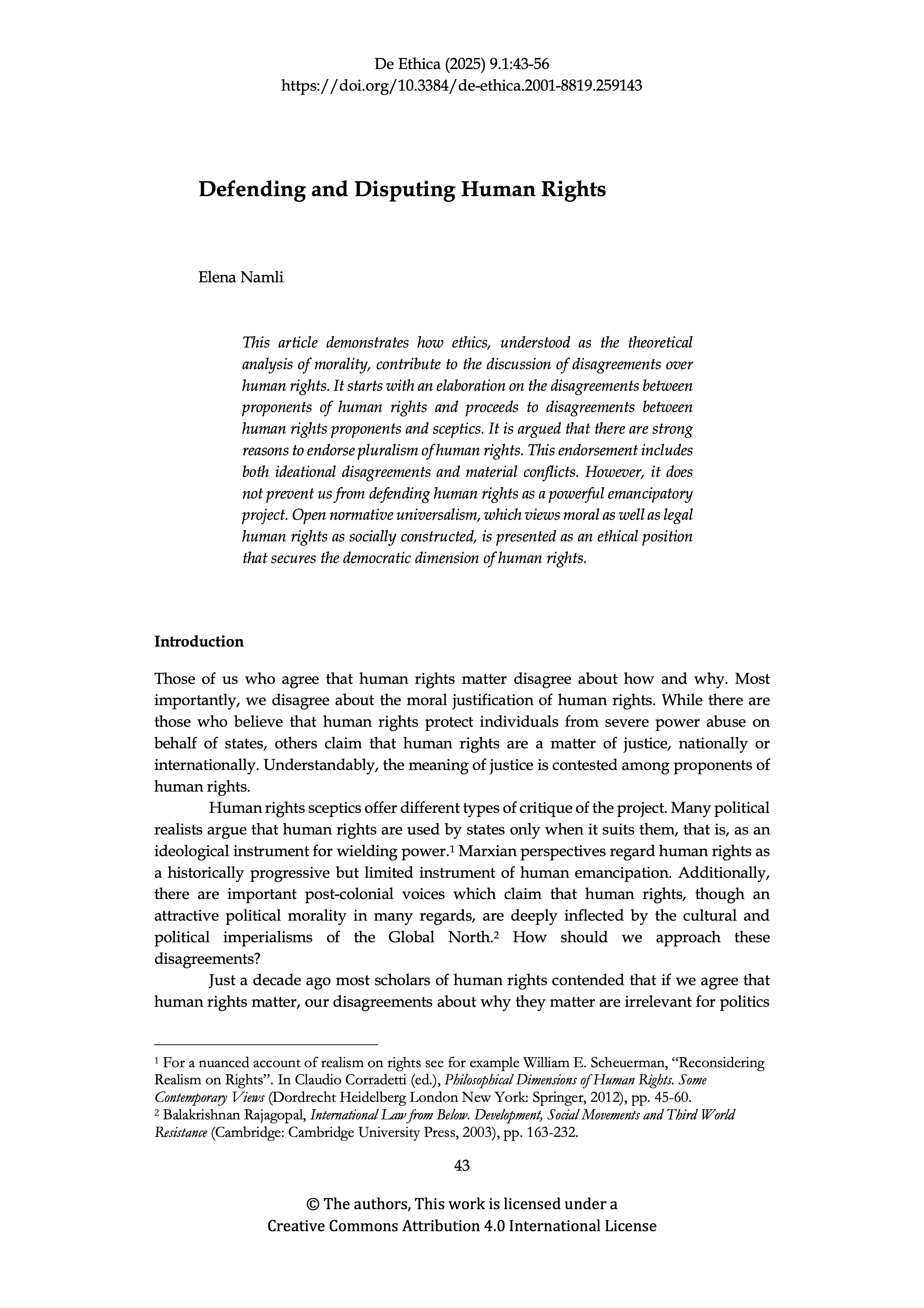Defending and Disputing Human Rights
DOI:
https://doi.org/10.3384/de-ethica.2001-8819.259143Keywords:
pluralism of human rights, politics and human rights, open universalism of human rightsAbstract
This article demonstrates how ethics, understood as the theoretical analysis of morality, contribute to the discussion of disagreements over human rights. It starts with an elaboration on the disagreements between proponents of human rights and proceeds to disagreements between human rights proponents and sceptics. It is argued that there are strong reasons to endorse pluralism of human rights. This endorsement includes both ideational disagreements and material conflicts. However, it does not prevent us from defending human rights as a powerful emancipatory project. Open normative universalism, which views moral as well as legal human rights as socially constructed, is presented as an ethical position that secures the democratic dimension of human rights.
References
An-Na’im, Abdullahi Ahmed. Islam and the Secular State. Negotiating the Future of Sharia. Cambridge, Mass.: Harvard University Press, 2008.
Callewaert, Teresa. Theologies Speak of Justice. A Study of Islamic and Christian Social Ethics. Uppsala: Acta Universitatis Upsaliensis, 2017.
Donnelly, Jack. International Human Rights. Third edition. Boulder: Westview Press, 2007.
Dworkin, Ronald. Justice in Robes. Cambridge, Mass.: The Belknap Press of Harvard University, 2006.
Dworkin, Ronald. Taking Rights Seriously. Cambridge, Mass.: Harvard University Press, 1978.
Grenholm, Carl-Henric. Kritisk Politisk Etik. Om moralens betydelse inom politiken. Uppsala: Acta Universitatis Upsaliensis, 2024.
Habermas, Jürgen. Between Facts and Norms. Contributions to a Discourse Theory of Law and Democracy. Polity Press, Cambridge, 1996.
Habermas, Jürgen. “The Concept of Human Dignity and the Realistic Utopia of Human Rights,” in Philosophical Dimensions of Human Rights, edited by Claudio Corradetti. Dordrecht Heidelberg London New York: Springer, 2012, pp. 63-80.
Hare, R.M. Moral Thinking. Its Levels, Method and Point. Oxford: Clarendon Press, 1981.
Hart, Herbert L. A. “The Demystification of the Law,” in Hart, Essays on Bentham. Jurisprudence and Political Theory. Oxford: Clarendon Press, 1982, pp. 25-26.
Ignatieff, Michael. Human Rights as Politics and Idolatry. Princeton: Princeton University Press, 2001.
Klamberg, Mark. Power and Law in International Society. International Relations as the Sociology of International Law. London: Routledge, 2015.
Miller, David. “The Responsibility to Protect Human Rights.” Working Paper Series, Center for the Study of Social Justice SJ006 May 2007.
Namli, Elena. Human Rights as Ethics, Politics, and Law. Uppsala: Acta Universitatis Upsaliensis, 2014.
Rajagopal, Balakrishnan. International Law from Below. Development, Social Movements and Third World Resistance. Cambridge: Cambridge University Press, 2003.
Scheuerman, William E. “Reconsidering Realism on Rights,” in Philosophical Dimensions of Human Rights. Some Contemporary Views, edited by Claudio Corradetti. Dordrecht Heidelberg London New York: Springer, 2012, pp. 45-60.
Shoikhedbrod, Igor. Revisiting Marx’s Critique of Liberalism. Rethinking Justice, Legality and Rights. London: Palgrave Macmillan 2019.
Sumner, L. W. The Moral Foundation of Rights. Oxford: Clarendon Press, 1987.
Teson, Fernando R. (ed.). The Theory of Self-Determination. Cambridge: Cambridge University Press, 2016.
Tuori, Kaius and Karjalainen, Iida. “The European Far Right and Human Rights Language.” The International Journal of Human Rights 29, no. 1, 2025, pp. 1-21.

Downloads
Published
How to Cite
Issue
Section
License
Copyright (c) 2025 Elena Namli

This work is licensed under a Creative Commons Attribution 4.0 International License.
